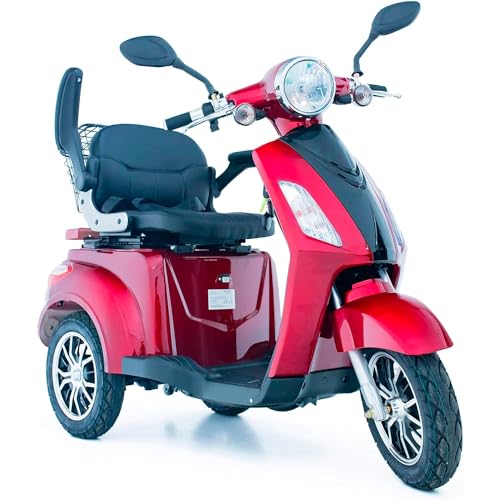Why Green Power Is The Best Choice For You?

Scooter Green Power
Scooters are a fun and safe method of getting around. Scooters are also environmentally friendly. However, it's important to do your research prior to purchasing one.
Scooters aren't as carbon-free as they appear. They are not without cost. The mining and production processes of the batteries used to power electric scooters create significant emissions. The environmental impact of transporting scooters from charging stations to places where riders leave them is also more significant.
Battery Life
Battery is among the most vital components of any scooter. It has a huge impact on the eco-friendliness of your scooter. When a battery dies, it releases toxic chemicals, which could have a massive ecological and economic impact.
Electric scooters are very efficient in energy use, and consume just a tiny fraction of the energy that cars do when driving the same distance. This can help reduce air pollution and climate change as well as traffic congestion. However, they still generate little carbon dioxide when charging. If this is from renewable sources, it could make the electric scooter more sustainable.

green power scooter reviews come with interchangeable batteries that can be used to charge other scooters within a fleet. This reduces the need for companies transporting their scooters to recharge. Some companies are also investigating hyper-local energy production. The grid can use the power stored in batteries to balance the supply and demand.
If you intend to make use of your scooter for longer trips you should consider buying an extra capacity battery or a spare battery that you can swap out. green mobility will be able to travel for further distances without having to recharge the battery as often. This is crucial if you are in an area that experiences harsh weather conditions. It is also a great idea to charge the battery before you store it for months or weeks. Inadequately doing this could result in the battery not keeping a charge until you need it again, which can be inconvenient and even dangerous.
Overall, electric scooters have a much lower environmental impact than other modes of transportation. They create fewer greenhouse gases which contribute to global warming, and require less raw materials to manufacture. They can be charged with clean energy, which can reduce their carbon footprint. When looking at the durability of a scooter, it is important to take into consideration its entire lifecycle. This includes the manufacturing of the scooter, the energy needed to charge it, and its disposal.
Design
Electric scooters' design could have a significant impact on their environmental reputation. For instance, scooters equipped with Regenerative braking systems can convert some of the energy that would otherwise be lost into additional battery life, so they can travel further with each charge. A lot of scooters are designed for shorter distances, which reduces the number of trips to the vehicle required. And, unlike traditional vehicles, scooters emit no carbon dioxide during use.
It is crucial to consider the environmental impact of electric scooters' entire life cycle. This includes the extraction of raw materials, the manufacturing and disposal at the end of its life. The production of lithium-ion batteries is especially energy-intensive, and could cause destruction of habitats, soil and water pollution as well as greenhouse gas emissions. The mining and transportation raw materials can have a significant impact on the environment.
The lack of durability is another important issue with scooters. The average scooter only lasts few months on the road before being discarded. This could force scooter manufacturers to extract even more aluminum and to engage in more resource-intensive processes like shipping. Additionally, since the majority of scooters are rented rather than owned, the scooters must be taken to charging stations (often by automobiles) when they are empty of juice.
In the event of a end of life, scooters could contain hazardous waste that could pose a threat to the health of the public and the environment. If the waste isn't properly recycled, it could end up in landfills or rivers, where people and wildlife can be at risk.
Scooters are more beneficial to the environment as a whole than traditional vehicles. However there are some issues to be taken care of before they can be considered 100% green. If all scooters were made from 100% recyclable material and the power that generates them is generated from renewable sources, they will be a carbon-free form of transportation.
Maintenance
An electric scooter may be less expensive than a traditional vehicle, but it still requires regular maintenance. The battery pack is the most important component to think about. It must be recharged regularly and replaced when it is nearing the end of its life. The speed controller also is a factor as well. If it isn't working properly it can impact the performance of the scooter.
When the scooter shuts off or stops while riding, this is typically a sign of an issue with the battery pack. It could also be a fuse or a charger that isn't working properly. Check that the charger's indicators are green (charging), not red (off). Even if you don't use the scooter, it's an ideal practice to charge it every time it is in storage.
Another common problem is a defective normally closed brake lever switch. To check for this, disconnect the wire from the brake lever switch and bridge the terminals together in the controller's connector the wire is disconnected from. If the scooter continues to run continuously, the switch is malfunctioning.
In the course of the day, scooter service providers deploy people to drive cars or trucks and return to their offices any electric scooter that has run out of power. This allows them to keep their fleet in good condition. This service allows them to recharge their batteries for the next trip. Many consumers do not have this option, and must change their scooters whenever they run out of juice.
